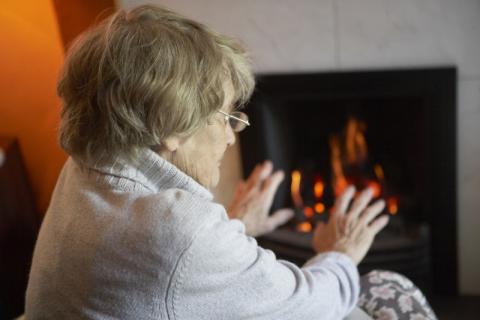Look after yourself this winter

The Public Health Agency is advising everyone to look after themselves and others, especially elderly, as the cold winter weather sets in. With high fuel costs and colder weather vulnerable groups such as older people find it increasingly difficult to afford to heat their home adequately.
Staying warm in winter
Keeping warm over winter months can help prevent colds, flu or more serious health problems like pneumonia. There are simple things you can do to keep warm and stay healthy and make the best use of your heating at home.
Heating your home
To keep warm at home:
• heat your main living room to around 18-21ºC (64-70ºF) and the rest of the house to at least 16ºC (61ºF)
• heat all the rooms you use in the day
• if you can’t heat all your rooms, make sure you keep your living room warm throughout the day and heat your bedroom before going to bed
• set the timer on your heating to come on before you get up and switch off when you go to bed
• in very cold weather set the heating to come on earlier, rather than turn the thermostat up, so you won’t be cold while you wait for your home to heat up
• never use an electric blanket and hot water bottle together as you could electrocute yourself
• if you have an electric blanket, check what type it is – some are designed only to warm the bed before you get in and should not to be used throughout the night
• make sure your electric blanket is safe to use by getting it tested every three years - the Fire Brigade, Trading Standards and Age Concern can test your electric blanket for safety
Make sure your heating is safe
It is important to make sure your heating is safe and that your house or workplace is properly ventilated, to reduce the risk of carbon monoxide poisoning.
• Carbon monoxide - are you at risk? (PDF 557KB)
• Help with PDF files
Wear something warm
You can help keep warm by:
• wearing plenty of thin layers, rather than one thick one
• putting on a coat, hat, scarf, gloves and warm shoes or boots when you go outside
• wearing clothes made of wool, cotton, or fleecy synthetic fibres
• wearing bed socks and thermal underwear at night
Eat Well – Food is a source of energy which helps to keep your body warm. Try and make sure you have hot meals and drinks regularly throughout the day.
Get a flu jab – You can get a free flu jab from your GP if you are over 65 or if you have a long-term health condition
Who to contact if you need further help
If you are worried about a relative or an elderly neighbour, contact your local council. There is also help and support from the charity age NI. Its website has information on how to stay warm in winter which contains useful contact numbers and advice.
• Cold Weather Payment information (pensions and retirement planning)
• Warm Front Scheme information (money, tax and benefits section)
• Winter Fuel Payment information (pensions and retirement planning)
• Winter wrapped up - age UK website
• Download 'The cold can kill' leaflet from age UK (PDF 420 KB)
• Help with PDF files
• age NI
Flooding and severe weather
Our weather can be severe and it can change rapidly. Extreme shifts in weather patterns can lead to flooding in vulnerable areas and make some roads and motorways inaccessible.
0300 2000 100 - flooding incident line
The Met Office works with the Rivers Agency, Roads Service and NI Water to forecast areas where floods are likely. You should contact your local agency in the event of flooding or ring the new flooding incident line on: 0300 2000 100.
The Met Office's severe weather warning page provides up-to-date information about weather that is likely to cause disruption.
If you are considering embarking on a journey during bad weather, you should consult the Met Office for travel conditions. If you must drive during severe weather, make sure you are prepared for bad weather conditions.
Contact PHA Press Office on 028 9031 1611
